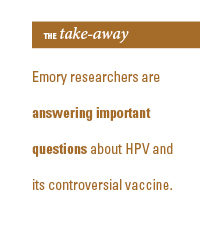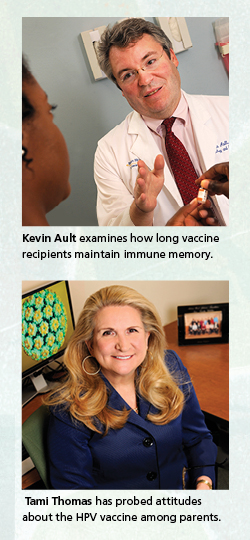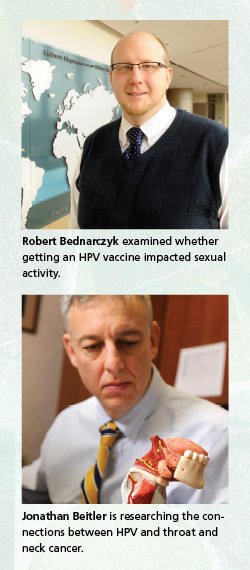Q & A on HPV
By Quinn Eastman

Illustration by Lorraine Tuson
 |
What is causing a surge in HPV infections associated with head and neck cancers in white men?
Will an HPV vaccine received at age 11 last long enough to protect women in their 40s when cervical cancer tends to strike?
In the fight against HPV, Emory gynecologist Kevin Ault is taking the long view.
Most cervical cancers are caused by two varieties of HPV (human papillomavirus), and a vaccine approved in 2006 can protect against both of them. Still, the long-term effectiveness of the vaccine is unknown.
"Let's say a girl in her early teens, someone like my daughter, gets the vaccine," Ault says. "But the average age of diagnosis for cervical cancer in the United States is the early 40s. The vaccine's shield has to last for decades for it to actually protect her against disease."
HPV itself is a wily adversary. Most people who become infected with HPV do not know that they have it. At least 80% of sexually active men and women carry the virus at some point in their lives, but in most cases, the immune system clears the virus from the body. Researchers have found that the virus hides in "crypts" in the cervix, anus, tonsils, base of tongue, and throat. More than 40 types of HPV can infect both men and women. Two types, HPV-16 and HPV-18, have been shown to cause cervical cancer, as well as most anal cancers and some vaginal, vulvar, penile, and head and neck cancers.
Ault is leading an NIH-funded study at Emory that looks at how long vaccine recipients maintain "immune memory." That is, how long does the immune system stay ready to fight the virus after receiving the vaccine? Study participants are healthy women between the ages of 18 and 26, who will be followed for three years. The research takes into account women who have received two rather than the recommended three doses of the HPV vaccine.
 |
Ault says recent findings about the pertussis vaccine may shed light on the long-term effectiveness of the HPV vaccine. In the 1990s, children in the United States began receiving a newer version of the pertussis vaccine that had fewer side effects than the original version. Researchers at Kaiser Permanente recently showed that immune protection fades faster with the newer vaccine, waning substantially five years after the last shot. They suggest that this lack of protection may be a contributing factor in the largest reported outbreak of pertussis in 50 years, which occurred in 2012.
"We wouldn't want people to rely on something that lasts a relatively short time," Ault says. His study will give clues on whether patients will need periodic HPV booster shots, like those for tetanus.
What do Georgia parents think?
In 2007, the CDC recommended that girls receive the HPV vaccine as a preventive measure at age 11 or 12. A few states instituted mandates requiring HPV vaccination for school attendance, but these requirements generated controversy. Some political and religious leaders believed that HPV vaccination was inappropriate for girls, arguing that it would encourage sexual behavior.
Since then, Robert Wood Johnson Foundation Nurse Faculty Scholar Tami Thomas has been probing the attitudes of parents about the HPV vaccine in three rural counties in eastern Georgia. The counties were chosen because of their low HPV vaccination rates (less than 18%), as well as relatively high rates of cancer and poverty. By comparison, 53% of adolescent girls in the United States have received at least one dose, and 35% have received all of the recommended three, according to the CDC.
In Georgia, those numbers are 48% and 30%, respectively.
With the support of the Robert Wood Johnson Foundation and the National Institute of Nursing Research, Thomas has surveyed more than 500 parents and conducted focus groups about attitudes toward the vaccine. She began in 2009 by working with church and school leaders to establish relationships and gain the trust of local parents.
"We found a lack of information and lots of misinformation," Thomas says. "Some people didn't know there was an HPV vaccine, and some didn't know it could prevent these types of cancer."
Among her findings, cost or distance parents had to travel to have their child vaccinated were two barriers. Health providers who were suspicious of the HPV vaccine had discouraged parents from having their children vaccinated. And some parents questioned why it was necessary to vaccinate girls and boys in their early years.
"I tell them, ‘this is a preventive vaccine, just like many other vaccines that prevent illness in adulthood,'" Thomas says.
Ironically, Thomas' research on the attitudes of rural Georgia parents indicates that there may be less resistance to the idea of HPV vaccination for boys. The CDC added the recommendation that adolescent boys receive the vaccine in 2011.
Thomas is working with CancerQuest to craft educational materials tailored for parents. "These parents all love their kids and want the best for them, but the problem is making sure that they receive unbiased information," Thomas says. "I try to be the conduit of accurate, reliable information, rather than the imposing authority myself."
To that point, Emory vaccine researchers recently teamed up with Kaiser Permanente to examine clinical markers of sexual activity in girls who had received the HPV vaccine. Although previous studies surveyed girls about behavior, this study—published in Pediatrics in October—was the first to look at concrete outcomes. The study included almost 1,400 girls, aged 11 or 12, who were Kaiser Permanente members in Georgia in 2006 and 2007 (in the first 18 months after the HPV vaccine became available).
"Our study found a very similar rate of testing, diagnosis, and counseling among girls who received the vaccine and girls who did not," says Emory epidemiologist Robert Bednarczyk, who holds a joint appointment at Kaiser as an affiliated clinical investigator. "We saw no increase in pregnancies, sexually transmitted infections, or birth control counseling—all of which suggest the HPV vaccine does not have an impact on increased sexual activity."
A link to head and neck cancer?
 |
Evidence is emerging that HPV infection also is contributing to head and neck cancer. In a 2011 article published in Oncology, researchers at Emory's Winship Cancer Institute reported a "surge" in the past two decades of HPV-related tumors in the tongue and tonsils, especially among white men. Part of the increase is due to more sophisticated and intentional ways of looking for HPV, says Emory oncologist Jonathan Beitler.
"Ten years ago, it was not a perceived problem, but our world has changed," he says. "This used to be a disease of older men, smokers, and drinkers. Now we are seeing patients who are younger and more educated, without those traditional risk factors."
Beitler estimates that three-quarters of the patients he sees with head and neck cancer have HPV-related tumors. The surge may be connected to increased practices of oral sex and/or marijuana consumption. For example, having six or more oral sex partners increases a person's risk of developing head and neck cancer nine-fold, amounting to more than the increased risk coming from smoking.
On a brighter side, patients who have HPV-related tumors generally have better outcomes than those whose tumors have a different origin. The survival rates of these patients are higher, with five-year survival rates of 75% to 80%, compared with 50% for HPV-negative tumors.
The higher survival rates and younger patient profiles mean that oncologists treating head and neck cancer are trying approaches such as minimally invasive surgery and drugs that may have fewer side effects. "Our current challenge is figuring out how to de-intensify therapy in the best way and still cure the patient," Beitler says. "We want to make it possible for patients to get back to their lives."
In a national clinical trial in which Beitler is involved, researchers are comparing two anticancer drugs to treat head and neck cancer in combination with radiation. One approach uses a standard DNA-damaging agent, cisplatin, with the test drug, cetuximab, to block a growth factor found on head and neck cancer cells. The aim is to determine whether cetuximab can provide the same level of efficacy with reduced side effects, such as mouth sores. The investigators also hope to learn about the genes of the HPV varieties that contribute to activity in head and neck cancer.
Beitler notes that HPV varieties may continue to shift, indicating that vaccine studies like Ault's could guide updates in vaccine practices for both men and women. EH
Related Video
"HPV Test Better for Harder to Detect Cervical Cancer"
Related Links
"Study: HPV vaccine doesn't increase sexual activity in girls"
"HPV vaccine long-term effectiveness tested in clinical trial"






